UOW - HAS 906 Public Health: Workshop Synopsis, Reflection & Readings
VerifiedAdded on 2023/06/12
|8
|1856
|267
Report
AI Summary
This report provides a synopsis of a public health workshop featuring speakers Bushra Khan, Terry Dawson, Jack Bird, and Smriti, focusing on the integration of advanced technologies, critical thinking, resilience, and cultural sensitivity in public health practice. It reflects on the relevance of the Public Health course at UOW, emphasizing the need for internships and practical experience. The report also integrates insights from six HAS 906 readings, covering topics such as public health advocacy, overcoming fear in public health, reflection in professional development, factors influencing project implementation in the drug field, employability skills in health services management, and the importance of leadership skills in public health. The analysis highlights the competencies required of public health graduates and reflects on those gained throughout the course of study.
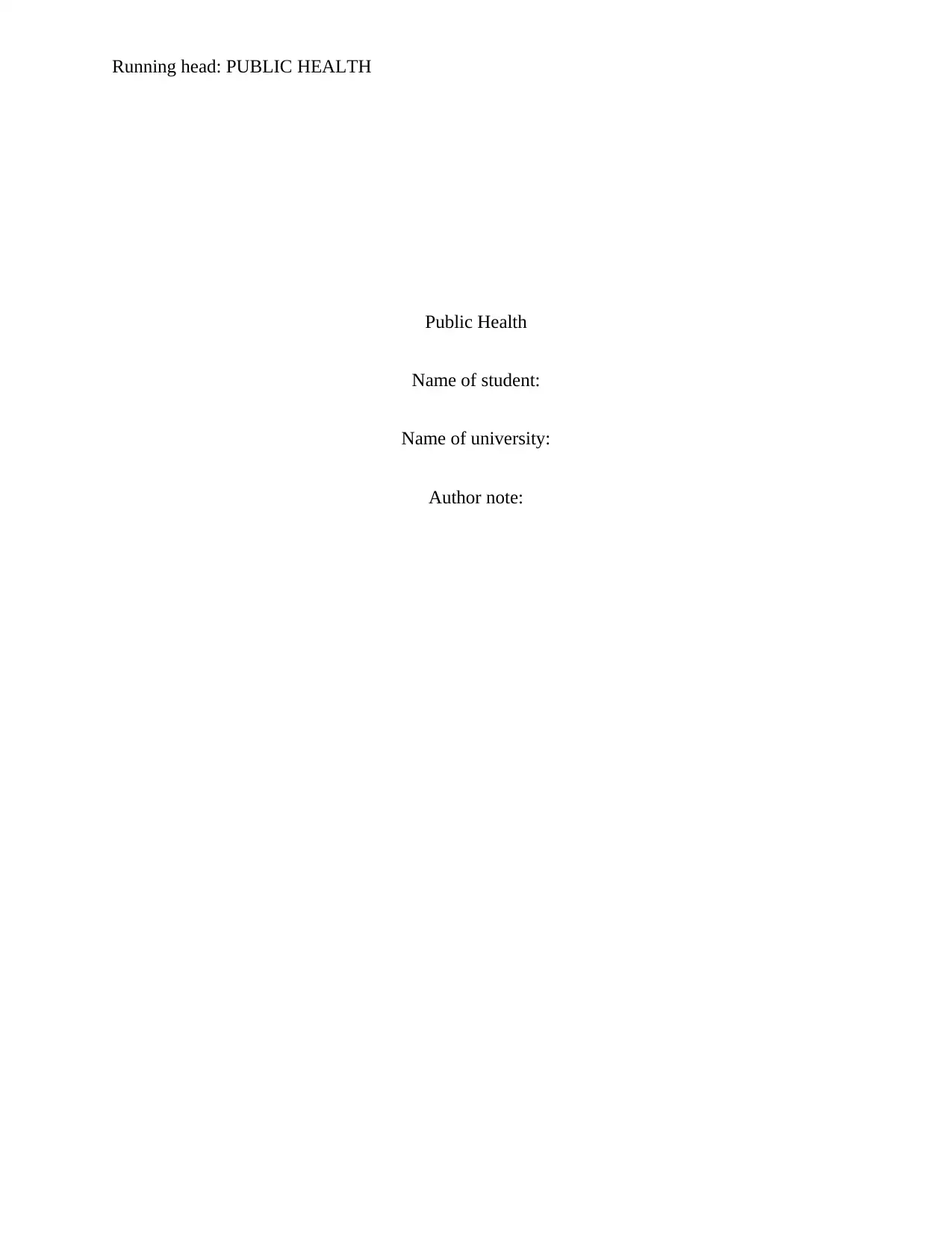
Running head: PUBLIC HEALTH
Public Health
Name of student:
Name of university:
Author note:
Public Health
Name of student:
Name of university:
Author note:
Paraphrase This Document
Need a fresh take? Get an instant paraphrase of this document with our AI Paraphraser
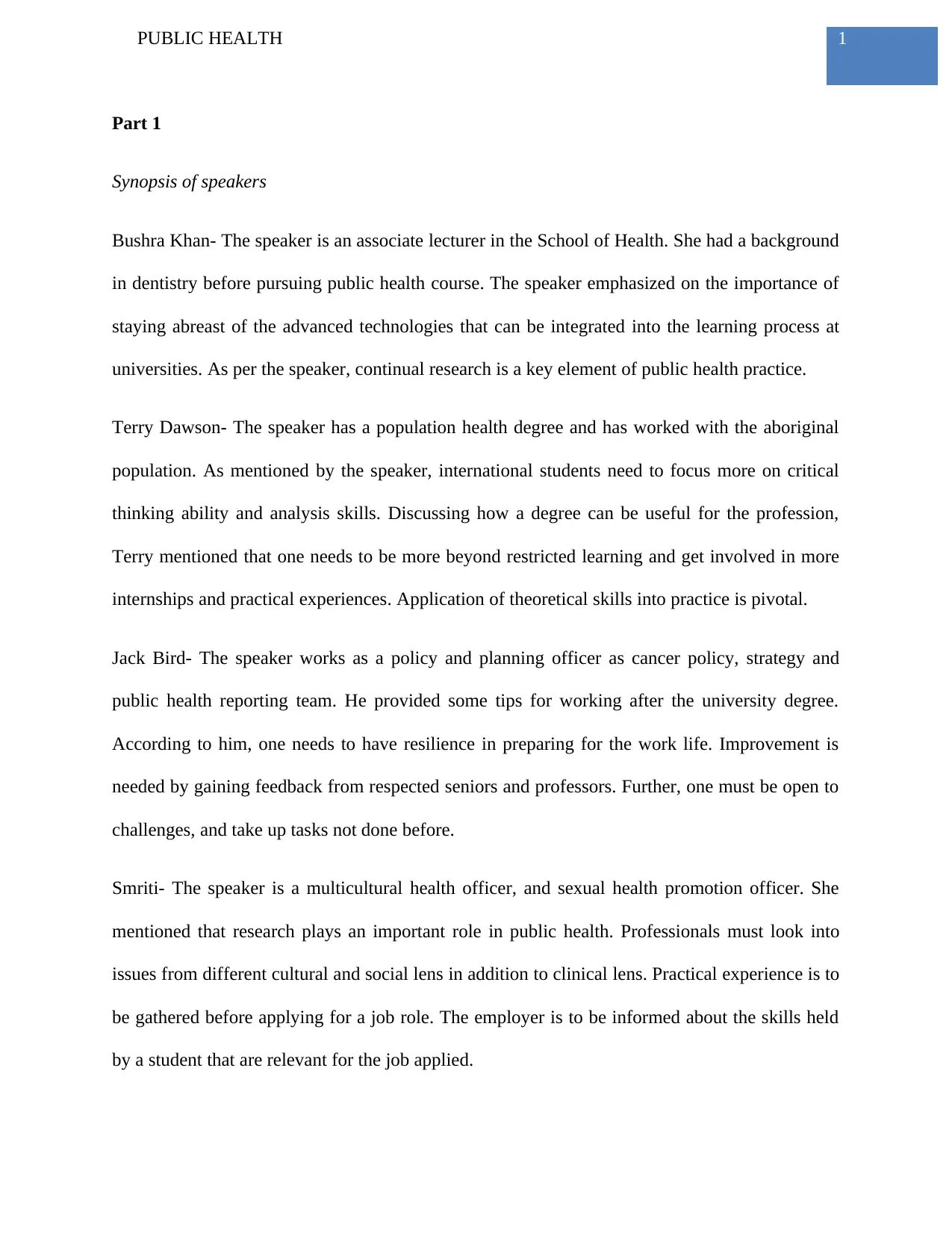
1PUBLIC HEALTH
Part 1
Synopsis of speakers
Bushra Khan- The speaker is an associate lecturer in the School of Health. She had a background
in dentistry before pursuing public health course. The speaker emphasized on the importance of
staying abreast of the advanced technologies that can be integrated into the learning process at
universities. As per the speaker, continual research is a key element of public health practice.
Terry Dawson- The speaker has a population health degree and has worked with the aboriginal
population. As mentioned by the speaker, international students need to focus more on critical
thinking ability and analysis skills. Discussing how a degree can be useful for the profession,
Terry mentioned that one needs to be more beyond restricted learning and get involved in more
internships and practical experiences. Application of theoretical skills into practice is pivotal.
Jack Bird- The speaker works as a policy and planning officer as cancer policy, strategy and
public health reporting team. He provided some tips for working after the university degree.
According to him, one needs to have resilience in preparing for the work life. Improvement is
needed by gaining feedback from respected seniors and professors. Further, one must be open to
challenges, and take up tasks not done before.
Smriti- The speaker is a multicultural health officer, and sexual health promotion officer. She
mentioned that research plays an important role in public health. Professionals must look into
issues from different cultural and social lens in addition to clinical lens. Practical experience is to
be gathered before applying for a job role. The employer is to be informed about the skills held
by a student that are relevant for the job applied.
Part 1
Synopsis of speakers
Bushra Khan- The speaker is an associate lecturer in the School of Health. She had a background
in dentistry before pursuing public health course. The speaker emphasized on the importance of
staying abreast of the advanced technologies that can be integrated into the learning process at
universities. As per the speaker, continual research is a key element of public health practice.
Terry Dawson- The speaker has a population health degree and has worked with the aboriginal
population. As mentioned by the speaker, international students need to focus more on critical
thinking ability and analysis skills. Discussing how a degree can be useful for the profession,
Terry mentioned that one needs to be more beyond restricted learning and get involved in more
internships and practical experiences. Application of theoretical skills into practice is pivotal.
Jack Bird- The speaker works as a policy and planning officer as cancer policy, strategy and
public health reporting team. He provided some tips for working after the university degree.
According to him, one needs to have resilience in preparing for the work life. Improvement is
needed by gaining feedback from respected seniors and professors. Further, one must be open to
challenges, and take up tasks not done before.
Smriti- The speaker is a multicultural health officer, and sexual health promotion officer. She
mentioned that research plays an important role in public health. Professionals must look into
issues from different cultural and social lens in addition to clinical lens. Practical experience is to
be gathered before applying for a job role. The employer is to be informed about the skills held
by a student that are relevant for the job applied.
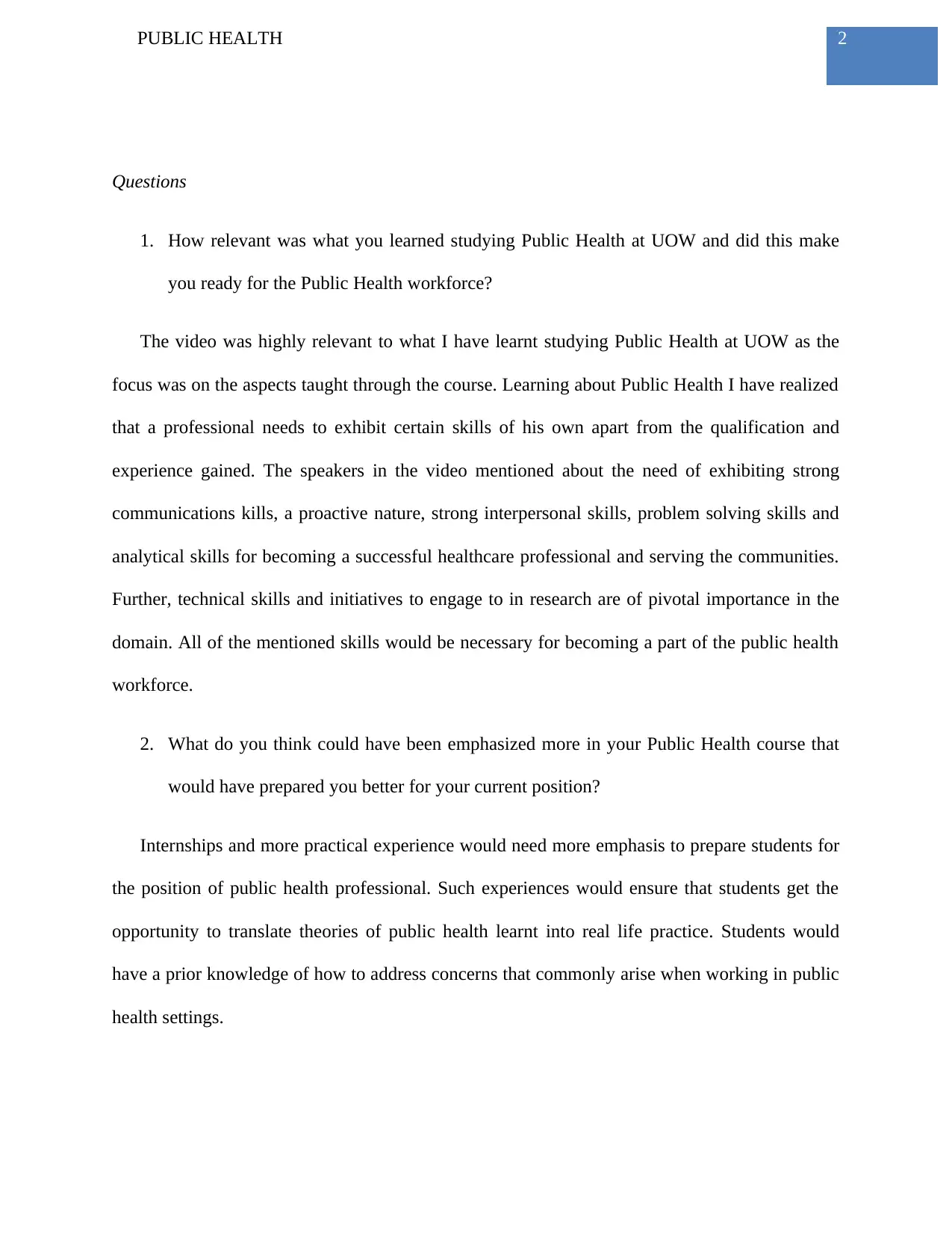
2PUBLIC HEALTH
Questions
1. How relevant was what you learned studying Public Health at UOW and did this make
you ready for the Public Health workforce?
The video was highly relevant to what I have learnt studying Public Health at UOW as the
focus was on the aspects taught through the course. Learning about Public Health I have realized
that a professional needs to exhibit certain skills of his own apart from the qualification and
experience gained. The speakers in the video mentioned about the need of exhibiting strong
communications kills, a proactive nature, strong interpersonal skills, problem solving skills and
analytical skills for becoming a successful healthcare professional and serving the communities.
Further, technical skills and initiatives to engage to in research are of pivotal importance in the
domain. All of the mentioned skills would be necessary for becoming a part of the public health
workforce.
2. What do you think could have been emphasized more in your Public Health course that
would have prepared you better for your current position?
Internships and more practical experience would need more emphasis to prepare students for
the position of public health professional. Such experiences would ensure that students get the
opportunity to translate theories of public health learnt into real life practice. Students would
have a prior knowledge of how to address concerns that commonly arise when working in public
health settings.
Questions
1. How relevant was what you learned studying Public Health at UOW and did this make
you ready for the Public Health workforce?
The video was highly relevant to what I have learnt studying Public Health at UOW as the
focus was on the aspects taught through the course. Learning about Public Health I have realized
that a professional needs to exhibit certain skills of his own apart from the qualification and
experience gained. The speakers in the video mentioned about the need of exhibiting strong
communications kills, a proactive nature, strong interpersonal skills, problem solving skills and
analytical skills for becoming a successful healthcare professional and serving the communities.
Further, technical skills and initiatives to engage to in research are of pivotal importance in the
domain. All of the mentioned skills would be necessary for becoming a part of the public health
workforce.
2. What do you think could have been emphasized more in your Public Health course that
would have prepared you better for your current position?
Internships and more practical experience would need more emphasis to prepare students for
the position of public health professional. Such experiences would ensure that students get the
opportunity to translate theories of public health learnt into real life practice. Students would
have a prior knowledge of how to address concerns that commonly arise when working in public
health settings.
⊘ This is a preview!⊘
Do you want full access?
Subscribe today to unlock all pages.

Trusted by 1+ million students worldwide
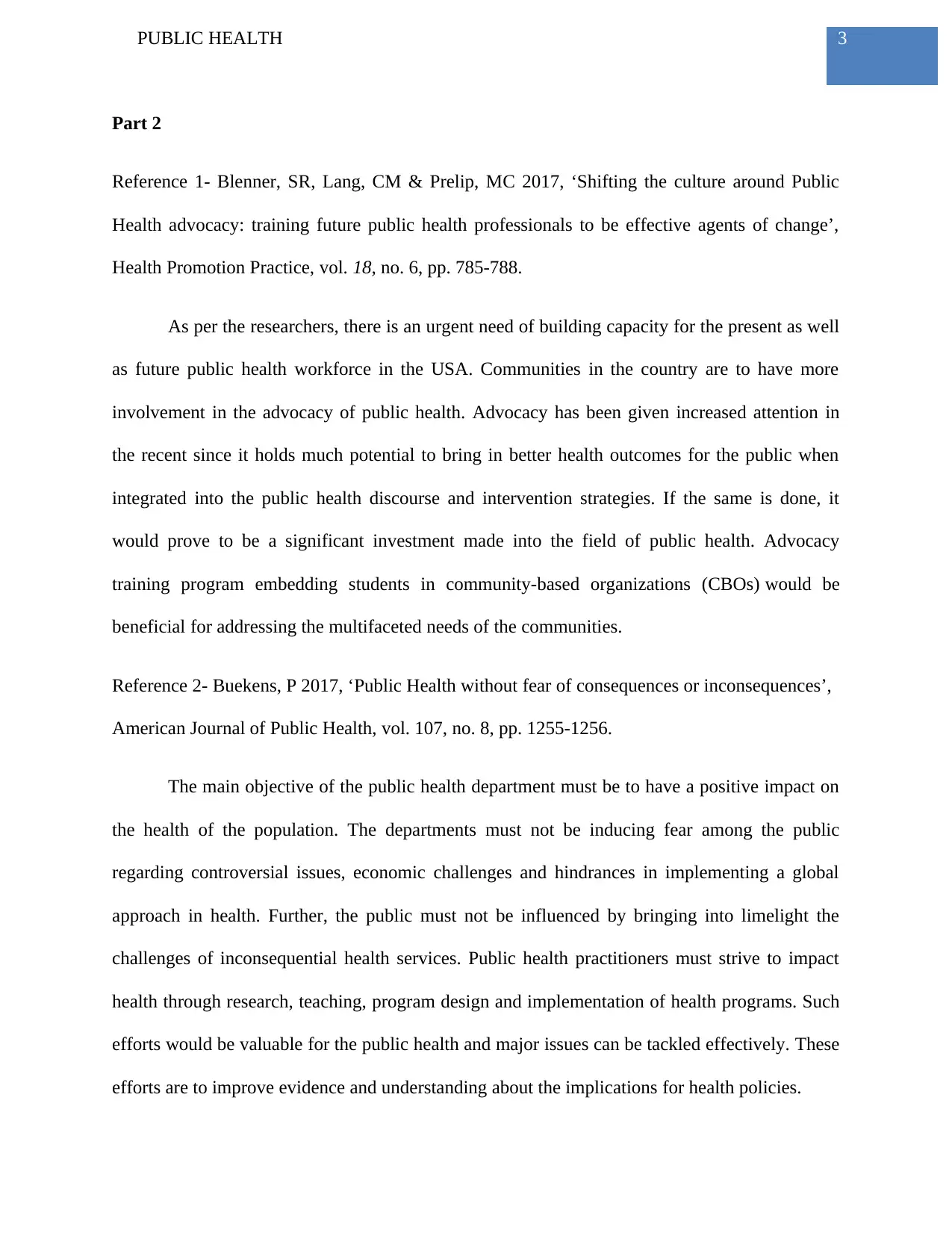
3PUBLIC HEALTH
Part 2
Reference 1- Blenner, SR, Lang, CM & Prelip, MC 2017, ‘Shifting the culture around Public
Health advocacy: training future public health professionals to be effective agents of change’,
Health Promotion Practice, vol. 18, no. 6, pp. 785-788.
As per the researchers, there is an urgent need of building capacity for the present as well
as future public health workforce in the USA. Communities in the country are to have more
involvement in the advocacy of public health. Advocacy has been given increased attention in
the recent since it holds much potential to bring in better health outcomes for the public when
integrated into the public health discourse and intervention strategies. If the same is done, it
would prove to be a significant investment made into the field of public health. Advocacy
training program embedding students in community-based organizations (CBOs) would be
beneficial for addressing the multifaceted needs of the communities.
Reference 2- Buekens, P 2017, ‘Public Health without fear of consequences or inconsequences’,
American Journal of Public Health, vol. 107, no. 8, pp. 1255-1256.
The main objective of the public health department must be to have a positive impact on
the health of the population. The departments must not be inducing fear among the public
regarding controversial issues, economic challenges and hindrances in implementing a global
approach in health. Further, the public must not be influenced by bringing into limelight the
challenges of inconsequential health services. Public health practitioners must strive to impact
health through research, teaching, program design and implementation of health programs. Such
efforts would be valuable for the public health and major issues can be tackled effectively. These
efforts are to improve evidence and understanding about the implications for health policies.
Part 2
Reference 1- Blenner, SR, Lang, CM & Prelip, MC 2017, ‘Shifting the culture around Public
Health advocacy: training future public health professionals to be effective agents of change’,
Health Promotion Practice, vol. 18, no. 6, pp. 785-788.
As per the researchers, there is an urgent need of building capacity for the present as well
as future public health workforce in the USA. Communities in the country are to have more
involvement in the advocacy of public health. Advocacy has been given increased attention in
the recent since it holds much potential to bring in better health outcomes for the public when
integrated into the public health discourse and intervention strategies. If the same is done, it
would prove to be a significant investment made into the field of public health. Advocacy
training program embedding students in community-based organizations (CBOs) would be
beneficial for addressing the multifaceted needs of the communities.
Reference 2- Buekens, P 2017, ‘Public Health without fear of consequences or inconsequences’,
American Journal of Public Health, vol. 107, no. 8, pp. 1255-1256.
The main objective of the public health department must be to have a positive impact on
the health of the population. The departments must not be inducing fear among the public
regarding controversial issues, economic challenges and hindrances in implementing a global
approach in health. Further, the public must not be influenced by bringing into limelight the
challenges of inconsequential health services. Public health practitioners must strive to impact
health through research, teaching, program design and implementation of health programs. Such
efforts would be valuable for the public health and major issues can be tackled effectively. These
efforts are to improve evidence and understanding about the implications for health policies.
Paraphrase This Document
Need a fresh take? Get an instant paraphrase of this document with our AI Paraphraser
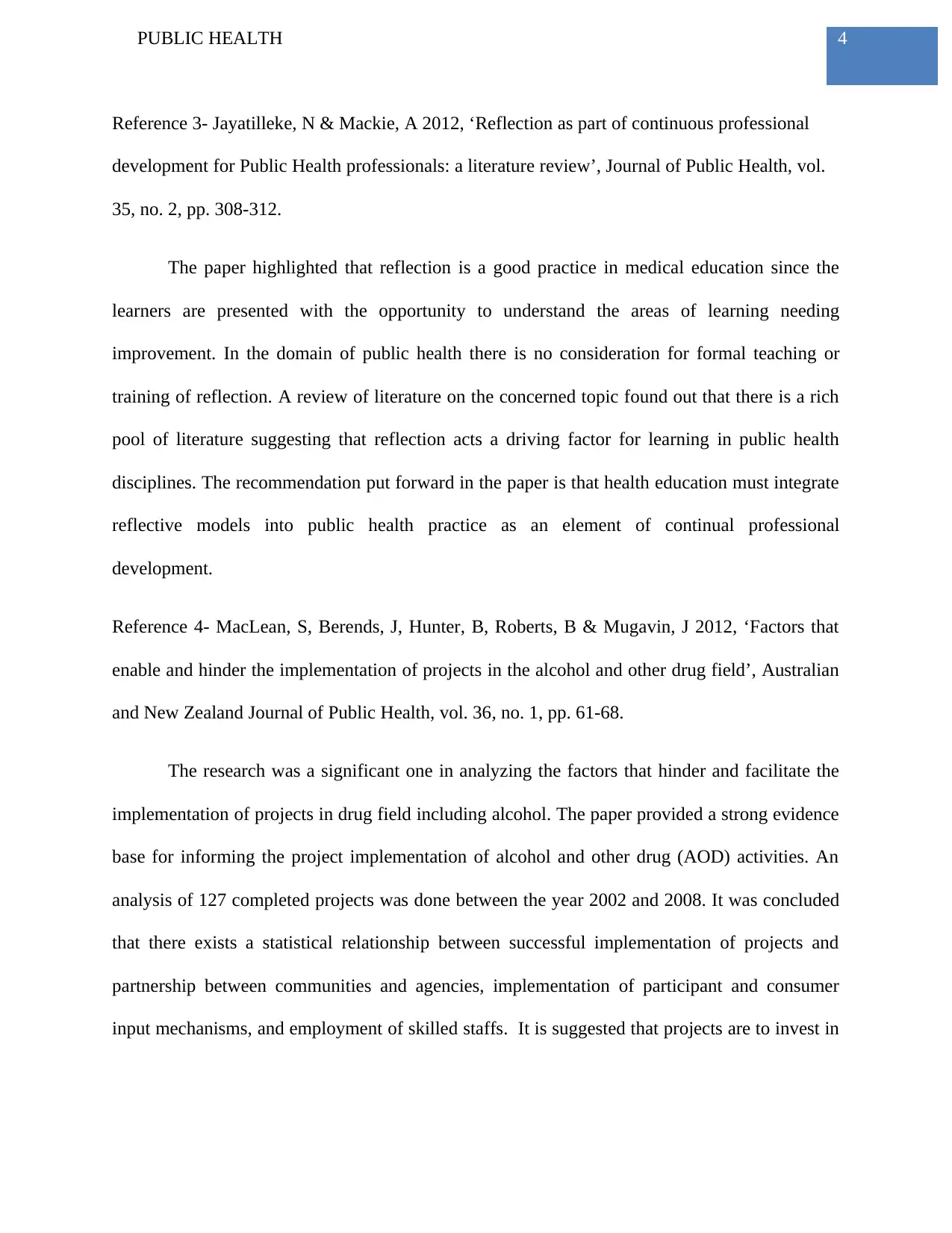
4PUBLIC HEALTH
Reference 3- Jayatilleke, N & Mackie, A 2012, ‘Reflection as part of continuous professional
development for Public Health professionals: a literature review’, Journal of Public Health, vol.
35, no. 2, pp. 308-312.
The paper highlighted that reflection is a good practice in medical education since the
learners are presented with the opportunity to understand the areas of learning needing
improvement. In the domain of public health there is no consideration for formal teaching or
training of reflection. A review of literature on the concerned topic found out that there is a rich
pool of literature suggesting that reflection acts a driving factor for learning in public health
disciplines. The recommendation put forward in the paper is that health education must integrate
reflective models into public health practice as an element of continual professional
development.
Reference 4- MacLean, S, Berends, J, Hunter, B, Roberts, B & Mugavin, J 2012, ‘Factors that
enable and hinder the implementation of projects in the alcohol and other drug field’, Australian
and New Zealand Journal of Public Health, vol. 36, no. 1, pp. 61-68.
The research was a significant one in analyzing the factors that hinder and facilitate the
implementation of projects in drug field including alcohol. The paper provided a strong evidence
base for informing the project implementation of alcohol and other drug (AOD) activities. An
analysis of 127 completed projects was done between the year 2002 and 2008. It was concluded
that there exists a statistical relationship between successful implementation of projects and
partnership between communities and agencies, implementation of participant and consumer
input mechanisms, and employment of skilled staffs. It is suggested that projects are to invest in
Reference 3- Jayatilleke, N & Mackie, A 2012, ‘Reflection as part of continuous professional
development for Public Health professionals: a literature review’, Journal of Public Health, vol.
35, no. 2, pp. 308-312.
The paper highlighted that reflection is a good practice in medical education since the
learners are presented with the opportunity to understand the areas of learning needing
improvement. In the domain of public health there is no consideration for formal teaching or
training of reflection. A review of literature on the concerned topic found out that there is a rich
pool of literature suggesting that reflection acts a driving factor for learning in public health
disciplines. The recommendation put forward in the paper is that health education must integrate
reflective models into public health practice as an element of continual professional
development.
Reference 4- MacLean, S, Berends, J, Hunter, B, Roberts, B & Mugavin, J 2012, ‘Factors that
enable and hinder the implementation of projects in the alcohol and other drug field’, Australian
and New Zealand Journal of Public Health, vol. 36, no. 1, pp. 61-68.
The research was a significant one in analyzing the factors that hinder and facilitate the
implementation of projects in drug field including alcohol. The paper provided a strong evidence
base for informing the project implementation of alcohol and other drug (AOD) activities. An
analysis of 127 completed projects was done between the year 2002 and 2008. It was concluded
that there exists a statistical relationship between successful implementation of projects and
partnership between communities and agencies, implementation of participant and consumer
input mechanisms, and employment of skilled staffs. It is suggested that projects are to invest in
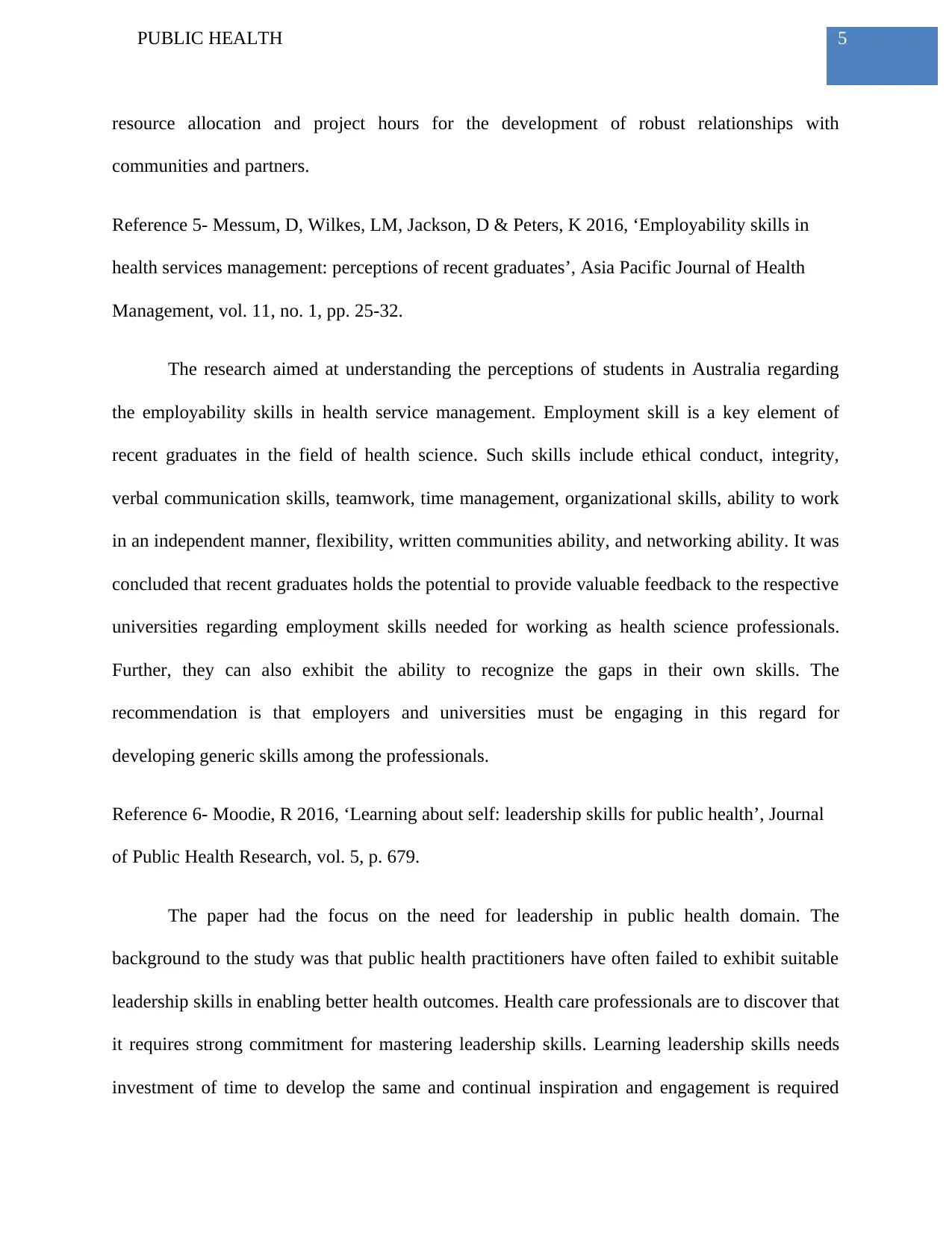
5PUBLIC HEALTH
resource allocation and project hours for the development of robust relationships with
communities and partners.
Reference 5- Messum, D, Wilkes, LM, Jackson, D & Peters, K 2016, ‘Employability skills in
health services management: perceptions of recent graduates’, Asia Pacific Journal of Health
Management, vol. 11, no. 1, pp. 25-32.
The research aimed at understanding the perceptions of students in Australia regarding
the employability skills in health service management. Employment skill is a key element of
recent graduates in the field of health science. Such skills include ethical conduct, integrity,
verbal communication skills, teamwork, time management, organizational skills, ability to work
in an independent manner, flexibility, written communities ability, and networking ability. It was
concluded that recent graduates holds the potential to provide valuable feedback to the respective
universities regarding employment skills needed for working as health science professionals.
Further, they can also exhibit the ability to recognize the gaps in their own skills. The
recommendation is that employers and universities must be engaging in this regard for
developing generic skills among the professionals.
Reference 6- Moodie, R 2016, ‘Learning about self: leadership skills for public health’, Journal
of Public Health Research, vol. 5, p. 679.
The paper had the focus on the need for leadership in public health domain. The
background to the study was that public health practitioners have often failed to exhibit suitable
leadership skills in enabling better health outcomes. Health care professionals are to discover that
it requires strong commitment for mastering leadership skills. Learning leadership skills needs
investment of time to develop the same and continual inspiration and engagement is required
resource allocation and project hours for the development of robust relationships with
communities and partners.
Reference 5- Messum, D, Wilkes, LM, Jackson, D & Peters, K 2016, ‘Employability skills in
health services management: perceptions of recent graduates’, Asia Pacific Journal of Health
Management, vol. 11, no. 1, pp. 25-32.
The research aimed at understanding the perceptions of students in Australia regarding
the employability skills in health service management. Employment skill is a key element of
recent graduates in the field of health science. Such skills include ethical conduct, integrity,
verbal communication skills, teamwork, time management, organizational skills, ability to work
in an independent manner, flexibility, written communities ability, and networking ability. It was
concluded that recent graduates holds the potential to provide valuable feedback to the respective
universities regarding employment skills needed for working as health science professionals.
Further, they can also exhibit the ability to recognize the gaps in their own skills. The
recommendation is that employers and universities must be engaging in this regard for
developing generic skills among the professionals.
Reference 6- Moodie, R 2016, ‘Learning about self: leadership skills for public health’, Journal
of Public Health Research, vol. 5, p. 679.
The paper had the focus on the need for leadership in public health domain. The
background to the study was that public health practitioners have often failed to exhibit suitable
leadership skills in enabling better health outcomes. Health care professionals are to discover that
it requires strong commitment for mastering leadership skills. Learning leadership skills needs
investment of time to develop the same and continual inspiration and engagement is required
⊘ This is a preview!⊘
Do you want full access?
Subscribe today to unlock all pages.

Trusted by 1+ million students worldwide
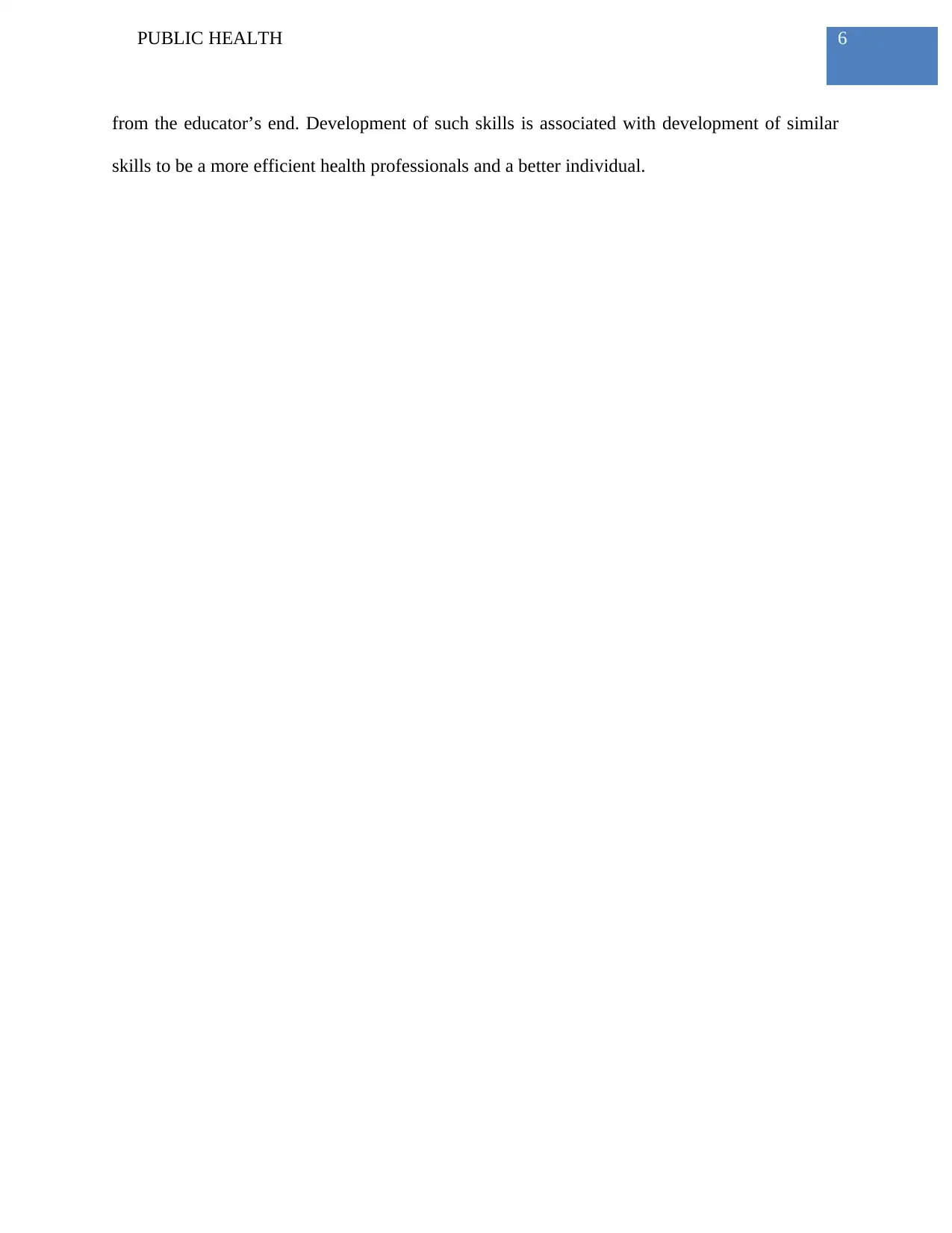
6PUBLIC HEALTH
from the educator’s end. Development of such skills is associated with development of similar
skills to be a more efficient health professionals and a better individual.
from the educator’s end. Development of such skills is associated with development of similar
skills to be a more efficient health professionals and a better individual.
Paraphrase This Document
Need a fresh take? Get an instant paraphrase of this document with our AI Paraphraser
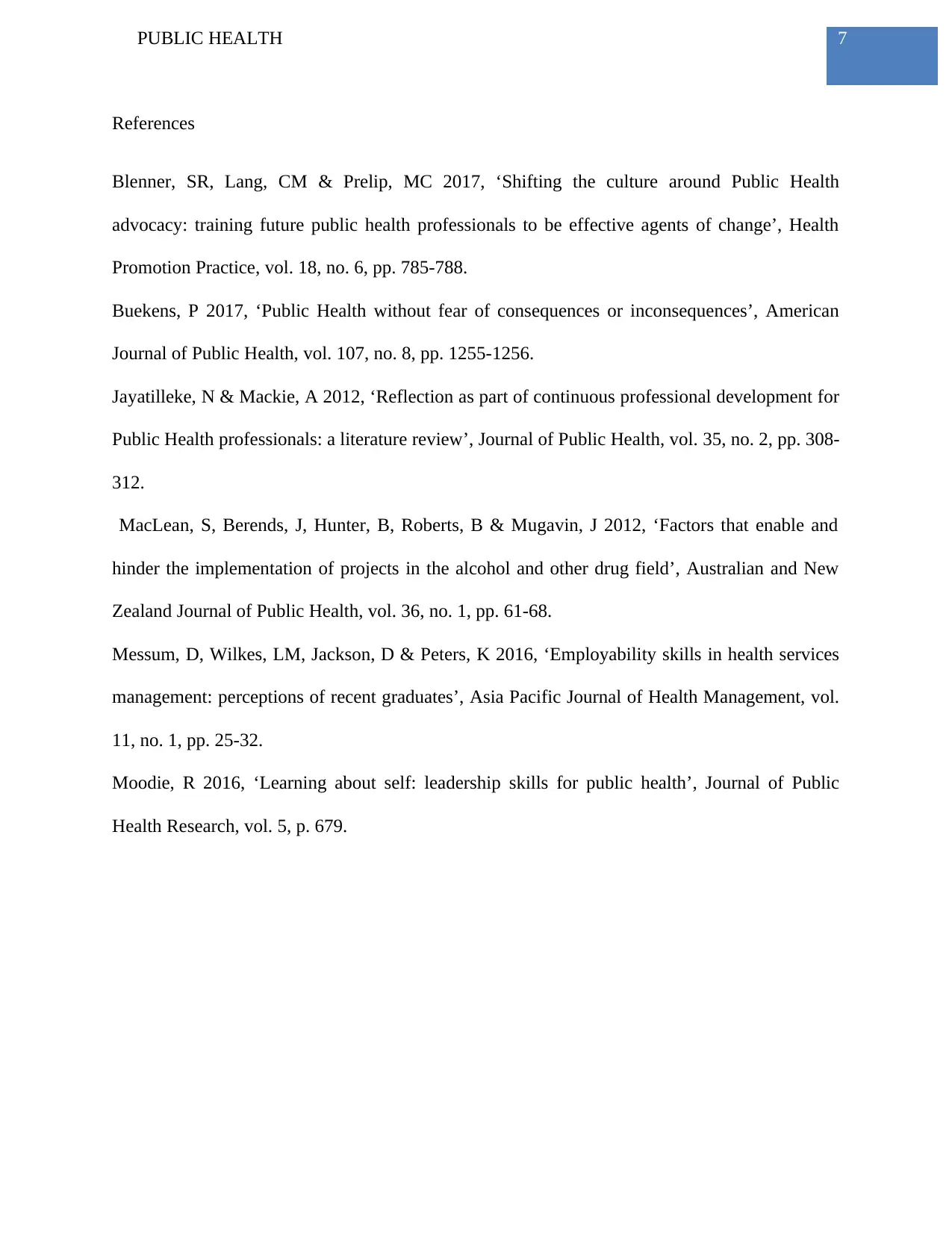
7PUBLIC HEALTH
References
Blenner, SR, Lang, CM & Prelip, MC 2017, ‘Shifting the culture around Public Health
advocacy: training future public health professionals to be effective agents of change’, Health
Promotion Practice, vol. 18, no. 6, pp. 785-788.
Buekens, P 2017, ‘Public Health without fear of consequences or inconsequences’, American
Journal of Public Health, vol. 107, no. 8, pp. 1255-1256.
Jayatilleke, N & Mackie, A 2012, ‘Reflection as part of continuous professional development for
Public Health professionals: a literature review’, Journal of Public Health, vol. 35, no. 2, pp. 308-
312.
MacLean, S, Berends, J, Hunter, B, Roberts, B & Mugavin, J 2012, ‘Factors that enable and
hinder the implementation of projects in the alcohol and other drug field’, Australian and New
Zealand Journal of Public Health, vol. 36, no. 1, pp. 61-68.
Messum, D, Wilkes, LM, Jackson, D & Peters, K 2016, ‘Employability skills in health services
management: perceptions of recent graduates’, Asia Pacific Journal of Health Management, vol.
11, no. 1, pp. 25-32.
Moodie, R 2016, ‘Learning about self: leadership skills for public health’, Journal of Public
Health Research, vol. 5, p. 679.
References
Blenner, SR, Lang, CM & Prelip, MC 2017, ‘Shifting the culture around Public Health
advocacy: training future public health professionals to be effective agents of change’, Health
Promotion Practice, vol. 18, no. 6, pp. 785-788.
Buekens, P 2017, ‘Public Health without fear of consequences or inconsequences’, American
Journal of Public Health, vol. 107, no. 8, pp. 1255-1256.
Jayatilleke, N & Mackie, A 2012, ‘Reflection as part of continuous professional development for
Public Health professionals: a literature review’, Journal of Public Health, vol. 35, no. 2, pp. 308-
312.
MacLean, S, Berends, J, Hunter, B, Roberts, B & Mugavin, J 2012, ‘Factors that enable and
hinder the implementation of projects in the alcohol and other drug field’, Australian and New
Zealand Journal of Public Health, vol. 36, no. 1, pp. 61-68.
Messum, D, Wilkes, LM, Jackson, D & Peters, K 2016, ‘Employability skills in health services
management: perceptions of recent graduates’, Asia Pacific Journal of Health Management, vol.
11, no. 1, pp. 25-32.
Moodie, R 2016, ‘Learning about self: leadership skills for public health’, Journal of Public
Health Research, vol. 5, p. 679.
1 out of 8
Related Documents
Your All-in-One AI-Powered Toolkit for Academic Success.
+13062052269
info@desklib.com
Available 24*7 on WhatsApp / Email
![[object Object]](/_next/static/media/star-bottom.7253800d.svg)
Unlock your academic potential
Copyright © 2020–2026 A2Z Services. All Rights Reserved. Developed and managed by ZUCOL.





